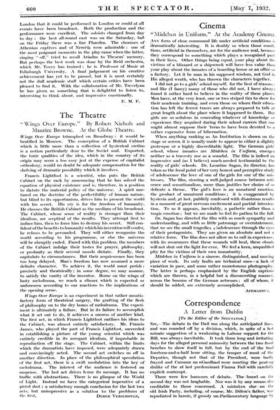The Theatre
" Wings Over Europe." By Robert Nichols and Maurice Browne. At the Globe Theatre.
Wings Over Europe triumphed on Broadway it would be beatified in Moscow. The conception of a British Cabinet which is little more than a collection of hysterical cretins is a notion particularly dear to the Soviet soul. Exported, the tonic qualities of the idea, which in the country of its origin' May seem a too easy jest at the expense of capitalist orthodoxy, would no doubt be adequate compensation for the shelving of dramatic possibility which it involves.
Francis Lightfoot is a scientist, who puts the British' Cabinet on the rack by announcing that he hai solvedthe equation of physical existence and is, therefore, in a position to dictate the material policy of the universe. A spirit nur- tured on the doctrine of the perfectibility of human nature, but blind to its opportunism, drives him to present the world with his secret. His cry is for the freedom of humanity. He chooses the British Cabinet as the medium of his broadcast. The Cabinet, whose sense of reality is stronger than their idealism, are sceptical of the results. They attempt first to induce him, then to force him to destroy his secret. Still con- fident of the benefits to humanity which his invention will confer, he refuses to be persuaded. They will either reorganize the world according to his programme,• or else the universe will be abruptly ended. Faced with this problem, the members of the Cabinet indulge their tastes for prayer, philosophy, or profanity as their several moods dictate. Finally, they capitulate to circumstances: But their acquiescence has been too long delayed. Man's freedom has now assumed a more definite character. To achieve it, the world must perish : precisely and theatrically ; in some degree, we may assume, to satisfy the vanity of the inventor. Borne on the wings of lusty melodrama, we reach a climax which is expected or unforeseen according to our reactions to the implications of the opening scene.
Wings Over Europe is an experiment in that rather unsatis- factory forM of theatrical surgery, the grafting of the flesh of philosophy on to the dry bones of Melodrama. The experi- ment is ultimately a failure. But in its failure to accomplish what it set out to do, it achieves a success of another kind. The first act; in which Francis Lightfoot outlines his ideas to the Cabinet, was almost entirely satisfactory-. Mr. Francis James, who played the part of Francis Lightfoot, succeeded -- in establishing a picture of the young scientist which was entirely credible in its arrogant idealism, if improbable in reproduction off the stage. The Cabinet, within the limits which the dMmatists have imposed, were adequately drawn and convincingly acted. The second act switches us off in another direction. In place of the philosophical speculation of the first act, there is a swift modulation into the key of melodrama. The interest of the audience is fostered on suspense. The last act drives home its message. It has no traffic with abstractions. There is no glimpse of the World of Light. Instead we have the -categorical imperative of a pistol Shot : a satisfactory enough conclusion for the last two acts, but unimpressive as a solution to the problems of






































 Previous page
Previous page